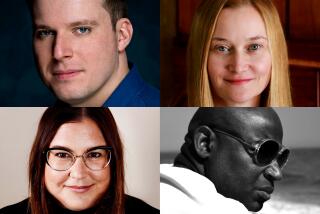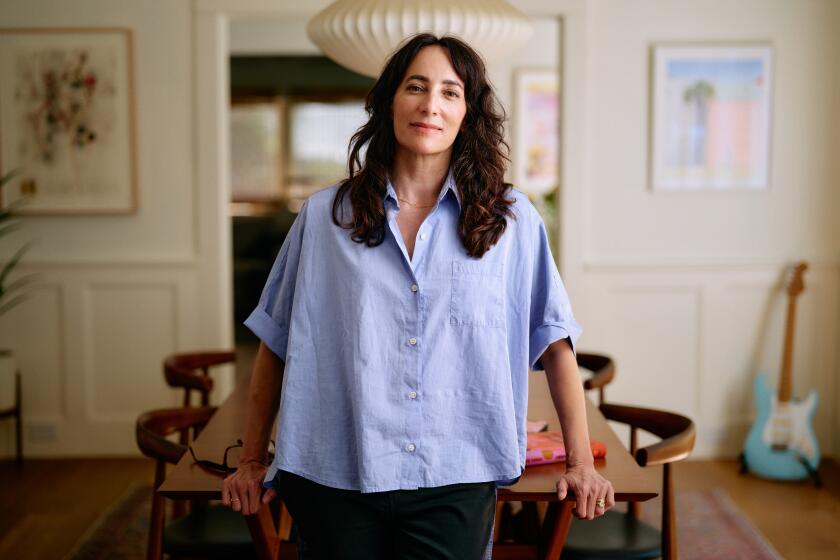Review: In a year of loss, two novels help Susan Straight rethink family and home
On the Shelf
Two books on home
Secrets of Happiness
By Joan Silber
Counterpoint: 288 pages, $27
Unsettled Ground
By Claire Fuller
Tin House: 330 pages, $27
If you buy books linked on our site, The Times may earn a commission from Bookshop.org, whose fees support independent bookstores.
During this year of upheaval, uncertainty and deep grief, ideas about what makes a home have obsessed us. Babies spent a year inside, teens rarely left their bedrooms, parents took care of three and four generations of family. Some people chafed at their inability to leave a residence; others burrowed more deeply into the space between walls. The precarious nature of shelter was everywhere around us — tents, shopping carts, encampments hidden under bridges and in the woods.
Two entrancing new novels arrived late in this moment, both by writers I’ve long admired. I read Claire Fuller’s “Unsettled Ground” and Joan Silber’s “Secrets of Happiness” in the 111-year-old house where I have lived for more than half my life. I was surrounded by people — daughters and son-in-law home for months, my ex-husband and cousins frequent visitors. I rode my bike to deliver food and comfort to my parents, who were unable to leave their assisted living residence two miles away. My days were consumed with family and food, my evenings consumed with these two books, as their truths about home were deeply entwined with the secrets and lies of parents.
“Unsettled Ground” is a brilliant and sly study of family in a rural English cottage, the kind of fairy-tale landscape people dream about (cottagecore!). Jeanie and Julius Seeder are twins, 51 years old, born in this place with flagstone floors and thatch roof. She raises chickens and vegetables; he works for dairies and contractors. But when their mother, Dot, dies, the world unravels. The house has no electricity; the bathroom is a wooden privy outside. The wealthy landlord demands thousands of pounds in back rent, while the twins can’t even afford a coffin for their mother, who lies on a table in the cold living room for days.
The tenant cottage is on farmland owned for generations by the Rawson family; Dot’s husband, Frank, worked the fields for Spencer Rawson, with whom Dot has some hidden history. Frank died in a tractor accident so gruesome it forever changed the children who witnessed it. Julius, unable to ride in a car ever after, bikes miles to work. Jeanie is told she has a heart condition, kept home and never taught to read or write. All of it hinges on a bolt found in the earth, and the lie Dot told about that small piece of metal.
Inkbourne is the village, and Fuller shrewdly deconstructs romantic notions about places like this, revealing a scene closer to Gothic horror. The husband of Dot’s best friend Bridget winds up fleecing the twins for a coffin and more. Jeanie tries and fails to cash her paychecks, finds that the iconic red public telephone box has been filled with used books. The landlord hires three thugs to evict the twins; their ancient furniture and belongings are put outside and immediately stolen.
Quarantined in Riverside, novelist Susan Straight watches “Gunsmoke” and “Gentefied” and gives away Judy Blume and National Geographic.
Julius finds them a dilapidated trailer deep in the spinney. Some of Fuller’s best writing limns the history in these chalk ridges and forests. They are full of not only beautiful flowers but terrible danger, as Bridget’s criminal son sets in motion the violence that will lead the twins to the truth inside the cottage they refuse to abandon.
“Secrets of Happiness,” a very different study of home, is classic Joan Silber. Like two previous acclaimed novels of hers, it is told in a story cycle, here with six narrators in seven chapters. “In high school everybody liked to hang around our apartment,” says Ethan, the first narrator. “It was homey and messy, with sprawling rooms, very Upper West Side, and big for Manhattan.” His father Gil, brash and charismatic, spent decades in “the rag trade” and traveled to Southeast Asia, bringing back silk scarves and clothes for his wife, Abby.
“When my father came home from a trip, she’d get all my friends to sing some goofy version of ‘Love Shack,’ she’d have sparklers flaming away in a platter of pasta,” Ethan remembers. She would quote Robert Louis Stevenson’s poem, “Requiem”: “‘Home is the sailor,’ my mother said, ‘home from the sea. And the hunter home from the hill.’”
But Gil also brought home Nok, a woman he met in Bangkok, and their two sons, Joe and Jack. At the Golden Treasure Thai Restaurant in Elmhurst, Queens, his father was proud that the hostess favored them — the hostess being Nok, who lives in Woodside with the boys. When Jack gets in trouble, Nok needs money; her paternity suit turns both families upside down. Abby kicks out Gil, who rents a studio apartment and then suffers a stroke. He lives with Nok, not Abby, until his death.
Silber’s effortless dissemination of facts in narrative is always impressive because her characters are so engaging and believable. Ethan, a diehard romantic but also a lawyer, has a great wry voice in dialogue with Abby, who teaches middle-school English in the Bronx and begins to travel the world alone. Joe, Nok’s eldest son, feels little for Gil, a father he never knew.
“Second Place,” Rachel Cusk’s first novel after the radical, brilliant “Outline” trilogy, follows a forceful woman who’s had enough of difficult men.
Around it goes: Jack’s brother Joe’s first love marries a rich filmmaker, who dies and leaves her nothing; she becomes a baker in Crown Heights. The third narrator, Maribel, had an affair with that filmmaker. The fourth, Rachel, ushers in the true throughline of the novel — family, loyalty and the rooms we call home. Her brother Saul is dying of lymphoma while his partner, Kirk, falls in love with Ethan, completing the cycle.
The tender care provided by Ethan for Saul and the memories of all the men lost to AIDS were for me the pulsing heart of the book. Happiness, for these characters, is inextricably linked to home. Saul’s secret is a copy of Stevenson’s “Treasure Island,” stolen from the library. Abby, who once recited Stevenson’s “Requiem,” now lights a candle for her dead sailor — for Gil. “Would my father have cared that he was being honored on the windowsill over the sink?” Ethan wonders. “How matter-of-fact my mother was as she struck the match, how excellent it was for me to see her.”
Both novels think deeply about constructs of the “ideal” home and the “normal” family, whether in pastoral England or cosmopolitan Manhattan, and resonate even more in this profoundly altered moment. Fuller’s cottage stayed in my dreams, the wood range glowing, and Silber’s single candle.
I kept seeing these images during repeated visits to the hospital with my 86-year-old stepfather, who had first endeared himself to 3-year-old me with the gifts of a Tonka Truck and the book “Blueberries for Sal.” Each time we returned from the hospital I bought him French fries and Coke at a drive-thru, our roles reversed, and he said softly, “This turned out pretty good.” Home wasn’t his studio apartment in lockdown, it was in the freedom of the car, the two of us repeating memories of every building we passed, and we carried tenderness through the night.
We know. We know. You want to look away, but you can’t.
Straight’s next novel, “Mecca,” will be published in March. Her memoir, “In the Country of Women,” is about six generations of women migrating to California.
More to Read
Sign up for our Book Club newsletter
Get the latest news, events and more from the Los Angeles Times Book Club, and help us get L.A. reading and talking.
You may occasionally receive promotional content from the Los Angeles Times.







